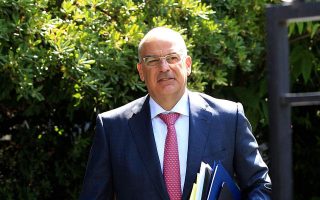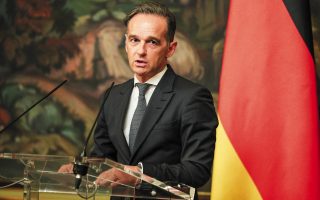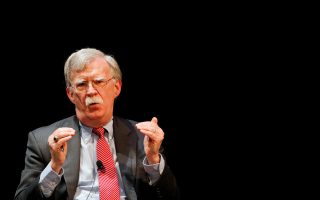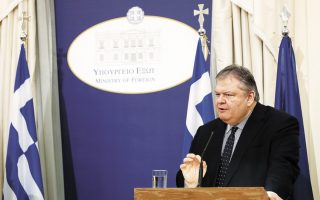Dialogue with Turkey is preferable to war, Avramopoulos tells Kathimerini
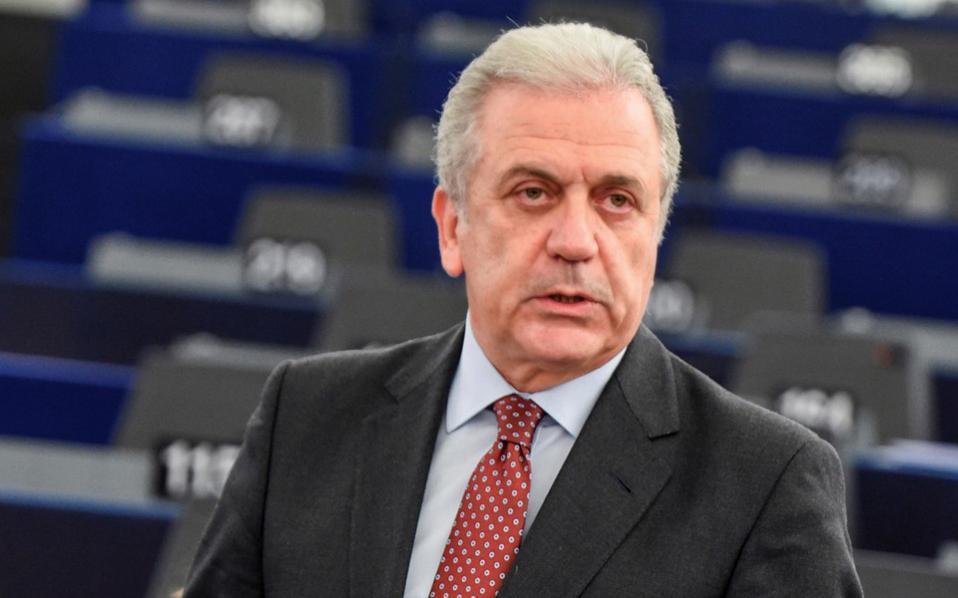
Greece is at a crossroads with Turkey where Athens must “answer a simple question: Dialogue or conflict?” “The answer is obvious,” former European commissioner Dimitris Avramopoulos tells Kathimerini – who is clearly in favor of dialogue.
Avramopoulos argues that exploratory contacts, which recommenced in Istanbul on January 25, can lead to tangible results, but on the condition that there is “strong political will, trust and mutual understanding.” In this framework, he adds, the role played by Greek Prime Minister Kyriakos Mitsotakis and Turkish President Recep Tayyip Erdogan is instrumental, as they are both “powerful leaders.” Referring to the relationship he has built with the Turkish president over the years, Greece’s former minister of defense and foreign affairs said that Erdogan often has an “emotional reaction to many issues.”
On the issue of migration – which was his portfolio at the European Commission from 2014 to 2019 – Avramopoulos applauds the efforts of the current government, but expresses fears that inflows may pick up again, mainly from North Africa, once the coronavirus pandemic subsides.
He also takes the opportunity to announce that he will be running for a seat in Parliament in the next elections, representing the First Constituency of Athens.
Greece is conducting exploratory contacts with Turkey. Do you see any tangible results arising from this process?
I think so, yes, but on the condition that there is strong political will, trust and mutual understanding. The message from the recent meeting in Istanbul was encouraging.
Turkey, however, appears to be raising the issue of the demilitarization of the Greek islands but also a revision of the Lausanne Treaty.
The issue of demilitarization has not been raised for many years and of course there is no question of a revision of the Lausanne Treaty. I am certain that this is something our neighbors know, just as they do that Europe and the United States’ position on this issue is clear. My reading of the situation is that the issue of demilitarization was brought back by Turkey’s ever-lurking deep state, which, history has shown, tends to intervene during periods of tension between the two countries in order to strengthen Turkey’s bargaining position.
You know President Erdogan well. How is he different today from how he was in 2000? Have you ever been invited, by virtue of this relationship, to serve as an additional channel of communication with the other side, especially during the heightened tension of the past year?
I will start by saying that interpersonal relationships can only be positive in relations between countries, and history has given us many such examples. Relationships between Eleftherios Venizelos, Kemal Ataturk and Ismet Inonu; between [former Turkish] president [Turgut] Ozal and [Greek prime ministers] Andreas Papandreou and Konstantinos Mitsotakis. If there is one word that defined my relationship with President Erdogan, it is trust. On this basis, we succeeded in coming to an understanding in resolving differences and achieving specific results on issues that had to do with European Union-Turkey relations, but also between the two countries. From my personal experience, I can say that whenever it was necessary to negotiate issues of a common interest on behalf of Europe, such as the migrant-refugee issue, for example, or security matters, the response was positive. There were also several occasions where solutions to political issues of lesser importance were found. It should also be noted that it is characteristic of Mr Erdogan to often have an emotional reaction to many issues. This is not necessarily a bad thing when talking with him.
Lastly, I was never asked to substitute or circumvent the institutional channels in Greek-Turkish relations; it is unthinkable. Of course, as you understand, in all these years, in the context of contacts as European commissioner, we always discussed how a means of communication could be found on Euro-Turkish and bilateral issues, with due respect, that would lead to a new era of stability, good-neighborly relations, security and peace.
As a European Commission “insider” for five years, how do you see Brussels’ stance on Greek-Turkish relations? Did we play the sanctions card correctly, or should we have done something differently in the EU context?
Let’s begin by noting that in order to evaluate Europe’s stance on Greek-Turkish relations, you must first evaluate the bilateral relationship between European states and Turkey. Europe does not have a common foreign policy, just as it does not have a common defense policy. So, each country’s stance is determined by its strategic and economic interests – and this ultimately explains the result of the sanctions “card.”
Former New Democracy prime minister Antonis Samaras expressed his opposition last week to the exploratory talks with Turkey and to possible recourse to The Hague. What is your opinion on these issues?
I have always been in favor of dialogue. During my time as foreign minister I encouraged the resumption of exploratory talks and two more cycles were held, the 53rd in October 2012 and the 54th in January 2013. These discussions took place in a relatively better climate and this was partly aided by my relationship with my counterpart, Turkey’s then foreign minister Ahmet Davutoglu. You understand of course that the content of those discussions could not and cannot be divulged. And because a lot is being written, I would also say that references to the substance of the talks are best avoided so as not to invalidate their purpose.
A summit between the two governments, headed by Mr Samaras and Mr Erdogan, also took place at that time in Istanbul. It was by general admission a success, and came with the signing of a large number of agreements between the ministers of the two governments. Mr Samaras of course has a consistent position on national issues. Under the present circumstances, though, diplomacy needs to take precedence – within the framework of international law of course – so that the tension can be defused and mutually acceptable solutions can be found. Our relations have come to a point in recent years where we must answer a simple question: Dialogue or conflict? The answer is obvious. Let me remind you that international disputes are resolved in one of three ways: direct talks, arbitration or, finally, war.
It is well-known that, at times, and from various positions you held, you kept an open line with Turkey’s leaders. How do you see relations going forward? Will this new resumption of talks lead to better relations?
The two countries’ history has shown that, when we have strong political leaders sharing a common vision and ready to share the cost in order to realize the common goals of peace, security and stability, anything is possible. This happened in 1930, when, with memories of the dramatic events of 1922, and with nearly a million refugees (from Asia Minor) in Greece, Eleftherios Venizelos and Kemal Ataturk signed a Friendship and Cooperation Accord between the two countries. A year later, in 1931, the people of Athens cheered for Venizelos and (Turkish Prime Minister) Ismet Inonu in the Panathenaic Stadium. If this could happen then, why not attempt to make it happen now, when both Greece and Turkey have strong leaders?
In the new course mapped out by the exploratory talks and, as conditions mature, both leaders will take the dialogue a step forward, ushering in a new era in relations between Greece and Turkey. I think conditions are evolving for us to talk with candor and far from the influence of those, on both sides, who attempt to impede, or even undermine, the effort toward an understanding. Erdogan and Mitsotakis can leave a legacy of friendship, cooperation and stability for the coming generations, creating conditions of growth, peace and progress for our two peoples. That’s what I meant earlier when I said that interpersonal relations are important when there is a vision, political will, mutual respect and, of course, political daring. Since 1930, there have been dozens of prime ministers in both countries, but those who changed the course of history and are still remembered are those who had a vision and a strong political will.
You are perfectly familiar with the migration issue because of your term in Brussels (as European commissioner for migration and home affairs from 2014 to 2019). How would you assess the government’s, and the EU’s, actions so far? What steps do you think were not taken but have to be?
The government has handled the migration issue very effectively and this is apparent both in the low migrant inflows and the dynamic response to the Evros incidents last February. Greece manages the common European borders effectively and always within the framework of European migration policy and of course by respecting international law’s fundamental principles on the rights of refugees and migrants.
During my term (as commissioner), European aid to Greece was unconditional, political, operational and financial. But we should note that, in the post-Covid era, it is very likely we in Europe will face new migrant flows, especially from North Africa. Europe and the frontline EU members must start preparing now.
Your network of important relationships has significantly expanded in recent years and your name was heard in discussions ahead of the recent reshuffle. Would you be interested in returning to a cabinet position, or is that part of your life over?
It was natural to make many important contacts, at the European and global levels. You see, both migration and security issues dominated over the past five years and were on the frontline of global political agendas.
But it is worth mentioning that, ahead of the 2019 national election, we had discussed with Mr Mitsotakis the possibility of me taking part. But if I had resigned (from the European Commission), Greece would be left without a commissioner for about nine months, since any commissioner who resigns during the last year of the Commission’s term is not replaced. It was for me an issue of political responsibility to remain until the end of the term. That my name, as you say, was heard (during the reshuffle) doesn’t mean there was a proposition. If it had happened, I would be the first to know.
You have returned to Greece. Will you also return to your political cradle, the First Constituency of Athens?
That’s exactly what I had said months before my return.
Are you worried about the economy? Do you fear another austerity program?
The post-Covid era will be one of great challenges for the Greek and the global economy. We still have a way to go to exit the pandemic. And the challenges for the “day after” are huge and critical. I am thinking mostly about Europe, which must immediately adapt its views and policies to the new global needs.
The fixation, to the limits of ideological obsession, with tough fiscal rules, rigid discipline, punishment for the weak, without any apparent and effective solidarity toward all member-states, that are equally hit by the pandemic, with the EU undertaking to shoulder the cost, must be revised the fastest possible. The recovery fund is a step in the right direction, but it needs to be strengthened and broadened.
We know the European Union is moving at its own pace. But we are now in a state of global war that demands the fastest response and new priorities. I want to hope that Europe’s political leaders will rise to the occasion. The government is preparing for the next day.
I am not worried there will be a new memorandum (between Greece and its creditors on an austerity program). Greece will impress with its economic recovery after the pandemic and it will be among the prime destinations for international investments. The main prerequisite is to support the middle class, by all available means, and to protect the most vulnerable social groups as long as the pandemic lasts and immediately afterward, until the economy returns to full speed. You should note, though, that the pandemic gave classical liberalism the opportunity to show its social side. And Kyriakos Mitsotakis should get credit for this. The qualitative findings of all opinion surveys, which show the penetration of our positions throughout the spectrum of voters, offer indisputable evidence.
How will Joe Biden’s election change – if at all – the political landscape in Greece and Europe following Donald Trump’s term?
Among Mr Biden’s top priorities is to restore US relations with the European Union and greater involvement in the escalating tension in the Eastern Mediterranean, which threatens the cohesion of the Euro-Atlantic alliance. Specifically, for our wider region, Greece, as a steadfast and reliable US ally, rightfully expects and awaits. But we should always keep in mind that what determines US foreign policy is their strategic interests. We should be aware of this when we talk about Turkish-US relations.
What’s your view of the political talk about New Democracy and SYRIZA fighting for the political center?
SYRIZA never had any political or ideological affinity with the liberal center; not even with social democracy. It gave ample evidence of that when it was in power. In contrast, New Democracy, since it was founded in 1974, continues to expand its political boundaries and has succeeded, through apolitical syntheses, to represent a broad alliance of democratic citizens. The social and political center is a meeting place of common understanding and, on its own, has absolutely nothing to do with ultra-leftist activism.

